A new wave of tobacco products that heat rather than burn tobacco is gaining traction across the globe, raising significant concerns among health experts about their long-term impact on public health, particularly among young users.
Heated tobacco devices such as IQOS, developed by Philip Morris International (PMI), offer a smoke-free alternative to traditional cigarettes by heating tobacco to generate a vapor. Promoted as a reduced-harm product, IQOS and similar devices are now sold in over 60 countries, including Italy and Japan, where they’ve seen rapid adoption since their 2014 introduction. The U.S. market is now beginning to see their re-entry, with IQOS currently being launched in Austin, Texas.
For longtime smoker Ben Taylor, an IT consultant, heated tobacco was a compelling alternative after failed attempts to quit through vaping. He described his experience with IQOS as closer to smoking than vaping, praising the taste and reduced odor. Like many users, Taylor also claimed health benefits, noting the disappearance of a persistent cough.
Tobacco firms argue that these products emit significantly lower levels of harmful chemicals compared to cigarettes. However, public health experts and independent researchers warn that heated tobacco is not without risk. Studies suggest they still emit toxins and fine particles capable of harming users and bystanders. Some compounds have even been found at higher concentrations in heated tobacco vapor than in cigarette smoke.
Despite corporate assurances that their marketing targets adult smokers, the products’ sleek designs and influencer-driven campaigns have drawn criticism. Events featuring celebrities and social media endorsements have fueled concern that young non-smokers are being enticed. Epidemiologist Silvano Gallus, who has studied tobacco trends in Italy, says youth uptake is widespread, contradicting the industry’s messaging.
A study by Gallus found that non-smokers who tried heated tobacco were nearly six times more likely to transition to cigarette smoking within six months. Though PMI disputes the findings and questions the study’s methodology, health experts fear a new generation may be lured into nicotine addiction.
Scientific research into the health effects of heated tobacco remains limited, and much of the data comes from industry-funded studies. Independent researchers such as Dr. Efthimios Zervas have identified toxic emissions from these products, including chemicals not found in cigarette smoke.
While companies like PMI claim their goal is a “smoke-free future,” global health authorities, including the World Health Organization, urge caution. With long-term effects still unknown and marketing practices under scrutiny, the debate over heated tobacco is far from over.


